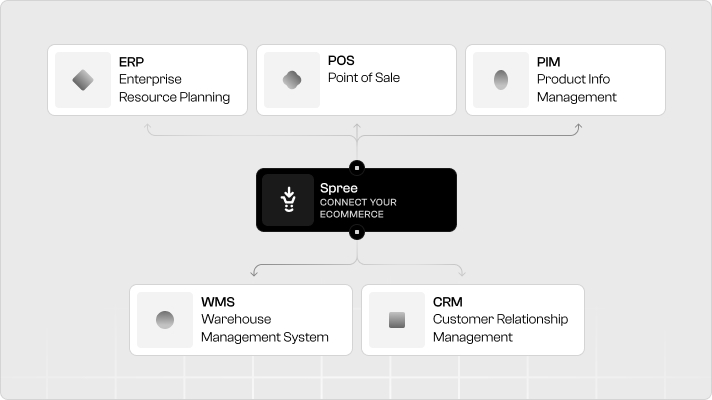
B2B eCommerce with Spree: The Open-Source Advantage
Businesses are increasingly seeking solutions that offer not just functionality, but also flexibility, scalability, and complete control over their digital storefronts.
While SaaS platforms have been a popular choice, they often come with limitations in customization and ownership. Enter Spree Commerce, a B2B open-source e-commerce platform that’s changing the game for B2B businesses. By choosing Spree, companies gain the power to tailor every aspect of their e-commerce platform to their unique needs, all while maintaining full ownership of their data and code.
Companies like Grainger, McMaster-Carr, and Alibaba have successfully implemented B2B e-commerce platforms that showcase the power of tailored solutions in this space.
Spree for B2B eCommerce
1. Custom Purchasing Flows
Spree allows businesses to create tailored purchasing processes that cater to the unique needs of B2B transactions:
- Example: An industrial equipment supplier using Spree to create a multi-step configuration process for complex machinery orders, including custom quoting and approval workflows.
- Example: A wholesale food distributor implementing bulk ordering with tiered pricing based on order volume, all customized to fit their specific product range and client base.
- Example: A chemical supplier creating a purchasing flow that includes safety checks, regulatory compliance forms, and specialized shipping options based on the nature of the chemicals being ordered.
2. Self-Service Portals
Empower your B2B clients with self-managed accounts:
- Example: An office supply company offering a portal where corporate clients can set up multiple sub-accounts for different departments, each with its own budget and approval process.
- Example: A textile manufacturer providing a platform for fashion designers to browse catalogs, request samples, and place orders, all within a branded, access-controlled environment.
- Example: An IT hardware distributor creating a portal where business clients can track their assets, manage warranties, and schedule maintenance or upgrades for their purchased equipment.
3. Multi-Tenant SaaS Platforms
Spree’s flexibility allows for the creation of multi-tenant platforms:
- Example: A software reseller using Spree to build a platform where multiple software vendors can manage their own storefronts, each with unique branding and product catalogs.
- Example: A franchiser in the restaurant supply industry creating a centralized ordering system where each franchise can manage its own inventory and orders while benefiting from group purchasing power.
- Example: A global manufacturing conglomerate using Spree to create a unified procurement platform where each subsidiary company has its own storefront, but can also access shared suppliers and benefit from group negotiated prices.
4. Complex Pricing Structures
Implement sophisticated pricing models tailored to your business:
- Example: An electronics components supplier offering customer-specific pricing, volume discounts, and special promotional rates, all managed through a single, customized Spree installation.
- Example: A professional services firm using Spree to create a unique pricing model that combines hourly rates, project-based pricing, and retainer options, all integrated with their custom CRM system.
- Example: An industrial raw materials supplier implementing a dynamic pricing model that adjusts in real-time based on market conditions, currency exchange rates, and availability, providing transparent and competitive pricing for B2B clients.
5. Account Management
Comprehensive tools for managing B2B client relationships:
- Example: A construction materials supplier implementing a credit system where different clients have varying credit limits, payment terms, and approval workflows based on their history and volume of business.
- Example: A pharmaceutical distributor using Spree to create a platform with strict access controls, ensuring that only licensed healthcare providers can access and purchase certain products.
- Example: An automotive parts wholesaler developing a loyalty program within their B2B platform, where business customers earn points on purchases that can be redeemed for discounts, priority shipping, or exclusive products.
Real-Life Examples of B2B Platforms
Several companies have successfully implemented B2B e-commerce platforms that demonstrate the potential of customized solutions:
- Grainger: A leading industrial supply company, Grainger’s B2B platform offers a vast catalog of products with features tailored for business customers, including bulk ordering and account-specific pricing.
- McMaster-Carr: This industrial supply company provides a highly detailed and user-friendly B2B platform, known for its comprehensive product information and efficient ordering process.
- Alibaba: While also serving B2C customers, Alibaba’s B2B platform connects manufacturers with buyers worldwide, offering features like supplier verification and trade assurance.
- ThomasNet: A platform connecting industrial buyers and suppliers, ThomasNet offers detailed product catalogs, CAD models, and supplier discovery tools.
- GlobalWineSpirits: A B2B marketplace for the beverage industry, this platform connects wineries and distilleries with professional buyers, offering features like bulk ordering and logistics management.
The Open-Source Advantage for B2B
Choosing an open-source platform like Spree Commerce for B2B e-commerce offers several key advantages over SaaS solutions:
- Full Customizability: Modify any aspect of the platform to fit your exact business processes and integrations.
- Ownership and Control: Your data and code remain under your control, crucial for sensitive B2B transactions and relationships.
- Cost-Effectiveness: Eliminate ongoing SaaS fees, especially beneficial for high-volume B2B operations.
- Scalability: Grow and adapt your platform without the constraints of a SaaS provider’s limitations.
- Integration Flexibility: Seamlessly connect with existing ERP, CRM, and other business systems without API limitations.
- Security: Implement custom security measures tailored to your industry’s specific requirements.
Conclusion
For B2B platforms, the flexibility, control, and customization offered by open-source solutions like Spree Commerce can be a game-changer. While SaaS platforms may offer quick setup, they often fall short when it comes to accommodating the complex, unique needs of B2B operations.
By choosing Spree Commerce, businesses can create truly tailored e-commerce experiences that grow and evolve with their specific requirements, all while maintaining full ownership and control of their platform. In the competitive world of B2B e-commerce, this level of customization and flexibility can be the key to standing out and succeeding in your market.
B2B eCommerce FAQ
How does an open-source eCommerce platform benefit B2B businesses?
Spree Commerce offers open-source eCommerce B2B flexibility and scalability, allowing full control over customization, integrations, and feature development. Businesses can adapt the platform to unique workflows without vendor lock-in or recurring licensing fees.
Can I customize my B2B storefront and workflows without limitations?
Yes. Spree Commerce enables fully customizable B2B eCommerce and workflows , giving developers and business owners the freedom to design custom checkout flows, approval rules, and dashboards tailored to complex B2B requirements.
How does Spree support integrations with other enterprise tools?
Spree Commerce supports API-first B2B integrations with external systems. It can easily connect with ERP, CRM, and accounting platforms to automate data exchange and improve operational efficiency.
Is an open-source B2B platform secure and compliant?
Yes. Spree Commerce includes enterprise-grade B2B security and compliance features such as role-based access control, encrypted transactions, and audit trails to meet corporate IT and regulatory standards.
Can I create different buying experiences for my customer segments?
Spree Commerce supports personalized B2B buying experiences and customer segmentation. You can define unique product catalogs, pricing rules, and permissions for each buyer group or organization.
How does Spree handle complex B2B business models?
Spree Commerce powers flexible multi-tenant B2B commerce models, supporting dealer portals, wholesale ordering, and multi-store setups. Its modular architecture lets businesses scale or extend features as operations grow.
What makes Spree’s open-source model a long-term advantage?
Spree Commerce’s open-source B2B eCommerce architecture ensures long-term sustainability by giving full ownership of code, freedom to innovate, and access to a global community that continuously improves and maintains the platform.



